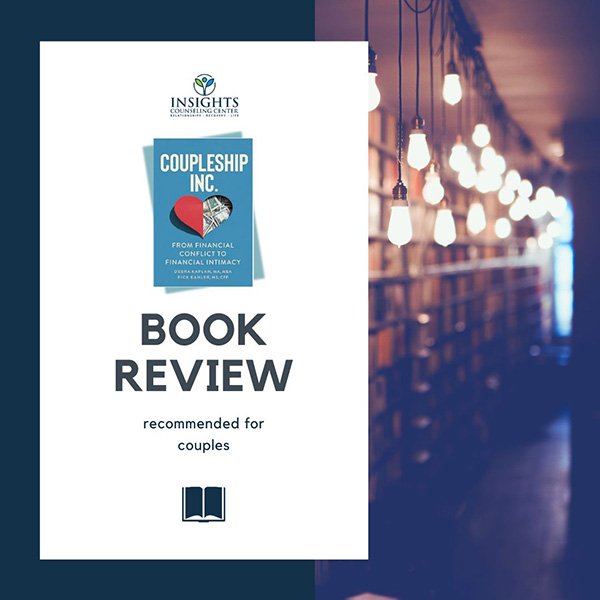
Money, Marriage, and Mental Health: Financial Therapy for Couples and Individuals
When Money Gets Messy, Emotions Run Deep
When money becomes a source of tension, silence, or shame, it can slowly erode even the strongest relationship. Financial struggles are rarely just about dollars—they’re about values, security, power, fear, and identity. At Insights Counseling Center, we specialize in helping individuals and couples understand their money stories and rewrite them together.
Whether you find yourself avoiding financial conversations or locked in recurring money fights, our approach to financial therapy goes beyond budgeting. We help you explore the beliefs, experiences, and relational patterns that shape how you handle money—and how money handles you.
Who This Is For
Financial therapy isn’t just for people with massive debt or serious financial crises. It’s for anyone who feels stuck, scared, or at odds when it comes to money. If you recognize yourself or your relationship in any of the descriptions below, financial therapy may offer the clarity and healing you need:
Couples who keep circling the same arguments about spending, saving, or earning
Individuals who feel anxious, ashamed, or out of control with money
Partners struggling with financial infidelity, control, or secrecy
Adults facing the fallout of growing up in financially traumatic or chaotic homes
Anyone curious about the emotional roots of their financial behaviors
Take The First Step Toward Connection
What We Address in Financial Therapy
In financial therapy, we look beyond the spreadsheets. We help you understand what’s driving your relationship with money and how it connects to the people and patterns in your life. Topics often explored include:
Money scripts and inherited beliefs from family or culture
Financial power struggles in relationships
Monetized rage and unspoken resentment
Spending, saving, and debt cycles that feel compulsive or divisive
Personal values, security needs, and identity themes
How trauma, addiction, or betrayal intersect with financial decisions
These issues often overlap with other concerns we address in therapy. We integrate this work with couples therapy, sex addiction recovery, betrayal trauma, and even family therapy when intergenerational money patterns are present.
What Makes Our Approach Different
We’re not financial advisors. We’re licensed therapists trained in the emotional and relational dimensions of financial health. Our co-founder, Teresa Prince, LPC, is a Certified Multiple Addiction Therapist in Financial Disorders. She works alongside a team of IITAP-trained sex therapists and clinicians with expertise in trauma and compulsive behaviors, including Tal Prince and David Tucker, who specialize in multiple addictions and the interplay between relational, sexual, and financial patterns.
We approach financial therapy collaboratively—often staffing or consulting with other members of our team to ensure comprehensive support. This means you’re not just getting one perspective; you’re benefiting from a coordinated, relationally attuned treatment team.
Using tools from Coupleship Inc. and the field of financial psychology, we help you:
Bring clarity to unspoken financial assumptions
Communicate about money without escalation or shame
Identify underlying emotions that drive harmful money behaviors
Develop a shared plan that honors each partner’s history and needs
We believe financial therapy is emotional work. And it’s relational work. It’s about repairing trust, renegotiating power, and finding new ways to relate to both money—and each other.
Inside Our Financial Therapy Tools and Resources
You’ll find downloadable exercises and psychoeducational tools available in our Financial Therapy Resource Library, including:
The Money Pyramid: A framework for values-based financial planning
Money Script Worksheets: Uncover the hidden beliefs that shape your financial habits
Personal Financial Health Plan: A guided roadmap for creating healthier patterns
Monetized Rage and Power Inventory: Tools to explore resentment and control
Behavioral Bias Worksheets: Insight into psychological blind spots around money
We use these tools in session and encourage clients to revisit them between sessions for deeper insight and growth. They can be especially helpful in couples therapy where one or both partners feel misunderstood or misaligned around financial decisions.
“We didn’t realize how much was really behind the discomfort we’d felt
around money for years. We thought we just had to agree to disagree—but
now we have a shared purpose
that actually feels good for both of us.
We’ve gone from gridlock to growth.”
— Couple in financial therapy
How We Support Financial Healing
Money issues don’t resolve with logic alone. They require emotional safety, relational honesty, and space to explore how past experiences shaped your current financial behaviors. Whether you're navigating resentment over hidden debt, recovering from financial betrayal, or simply feeling exhausted by financial stress, we can help.
In therapy, we create a safe space for:
Naming your money story without shame
Recognizing when financial habits are protecting deeper emotional wounds
Creating collaborative plans that strengthen the relationship instead of tearing it down
Rebuilding trust in the wake of secrecy, control, or betrayal
Want deeper insight into your money dynamics?
We also offer the Money and Work Adaptive Styles Index (MAWASI®), a powerful assessment developed by Bonnie DenDooven. Based in attachment theory, neuromarketing, and behavioral economics, the MAWASI helps clients understand how their early experiences and adaptive behaviors influence money and work today. With 12 subscales, this tool gives couples a rich starting point for conversations about identity, power, and stress. It’s especially helpful in couples therapy when financial strain has become a relational pattern.
Recent Posts
Maybe You’re Curious About Financial Therapy at Insights Counseling Center, But You’re Still Not Sure…
Can financial therapy help if my partner and I have completely different spending habits?
Yes. Differences in spending or saving habits are incredibly common and often rooted in deeper money scripts, family history, or emotional needs. Financial therapy helps couples understand the underlying "why" behind their behaviors and work toward shared values and agreements that support both individuals and the relationship.
What if I feel ashamed about my past financial choices?
Shame around money is one of the most isolating experiences—and one of the most common. In therapy, we approach your story with compassion and curiosity, not judgment. Together, we’ll explore what those choices meant, how they protected you, and how you can move forward with clarity and confidence.
Is financial therapy just about budgeting and money management?
Not at all. While practical tools may be included, financial therapy is primarily focused on the emotional and relational aspects of money. We address power dynamics, emotional safety, financial secrecy, and deeper patterns that influence how you relate to money—and to each other.
Does financial therapy work for individuals, or is it only for couples?
We work with both. Whether you're untangling money wounds from childhood, healing from financial betrayal, or trying to change your personal habits, individual financial therapy offers a safe space to understand your story and grow. Many clients start individually and later include their partner in the process.
Looking for Therapy?
We work with couples and individuals who want to transform the way money shows up in their relationships. Whether you’re rebuilding trust after financial betrayal or working through personal money wounds, we’re here to help you:
Understand your financial behavior
Build a shared language for discussing money
Create new relational patterns around spending, saving, and power
Because healing your relationship with money is about more than numbers. It’s about trust, honesty, and connection.
More Support for the Journey Ahead
Financial struggles rarely exist in isolation. At Insights Counseling Center, we recognize that money often intersects with other areas of your life—like intimacy, addiction, parenting, or even decisions about whether to stay or separate. That’s why our team offers integrated care across specialties:
Couples Therapy – Strengthen your relationship through deeper connection and communication.
Sex Addiction Recovery – Address compulsive behaviors and rebuild trust.
Family Therapy – Navigate generational money patterns and relational dynamics.
Discernment Counseling – Find clarity when money concerns are part of a larger decision about your relationship’s future.
You can also visit our secure, downloadable Financial Therapy Resource Library using the password provided by your therapist to access tools we use in session.









